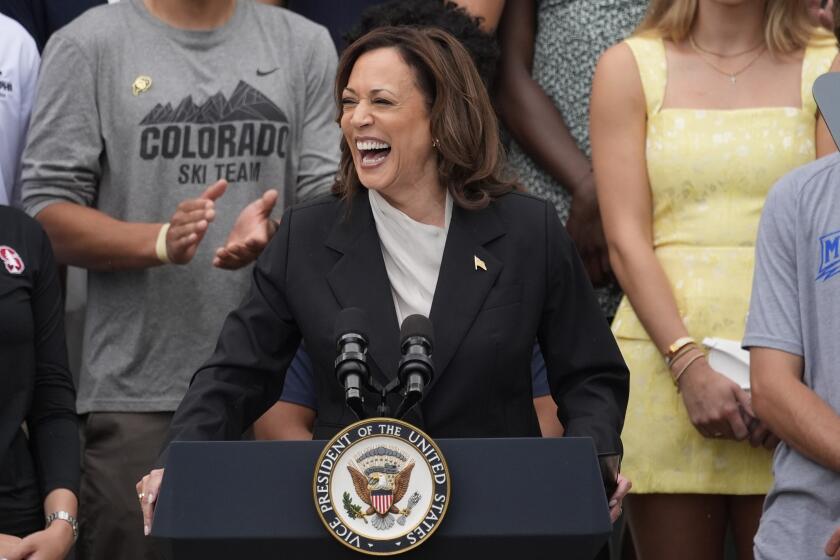Is GM really too big to fail?
Today’s topic: Given how far the demand for cars has fallen this year, would the failure of General Motors have put more stress on the industry, or just accelerated the “right sizing” that was already underway? In other words, was the company really too big to fail?
GM needs to downsize, but not too much
Point: Howard Wial
Worldwide demand for cars has fallen precipitously this year. General Motors’ sales in May were down by 30% from last May, Ford’s were down by 21%, and Toyota’s were down by 38%.
The effects are seen especially in the traditional automaking regions of the upper Midwest due to idled plants and furloughed workers, but soon they’ll be seen nationwide due to the planned downsizing of dealerships.
But auto sales won’t stay at current levels once the most severe recession in decades ends. Neither automakers nor the federal government should base their long-term policies on what has happened to sales during the depths of the recession. Instead, they should be looking at how the post-recession demand for U.S.-made cars in the 2010s and 2020s is likely to differ from what it was during the previous two decades.
For at least several years after the recession ends, the demand for cars assembled in the U.S. will probably be lower than in the decades before the recession. Interest rates could be higher than in the past if Asian capital flows into the U.S. slowly. Credit will be more difficult to get as lenders apply stricter standards. Consumers will do less borrowing against home equity to finance car purchases. And whether because of market forces or a public policy to price carbon emissions in some way, gasoline could well be more expensive.
Not only is the demand for U.S. cars likely to fall, it will take several years for GM even to be in a position to gain a larger share of a declining market, let alone sell more cars. The company has too many brands and too many dealers. Its cars aren’t yet up to the quality standards of the best foreign manufacturers. Under these conditions, some downsizing of GM is a sensible move.
Beyond the first few years after the end of the recession, the demand for U.S.-made cars could depend more on the strategic choices of U.S. manufacturers, including GM. If U.S. companies can get their quality at least up to the levels of their best foreign competitors, they will be well positioned to raise their market shares and possibly their sales. If gasoline prices are high enough, companies that pioneer the next generation of fuel-efficient (or alternative-powered) cars could see their sales as well as their market shares rise.
Looking at the long-term future of the U.S. auto industry in this way leads me to think that GM needs to shrink somewhat over the next few years but remain in a position to grow later on. Too much downsizing is at least as much of a danger as too little if it makes future growth impossible.
If too much downsizing is a danger, a total failure of GM would have been even worse. It would have taken too much productive and innovative capacity out of the U.S. auto industry and its crucial supply base, concentrated in regions already suffering heavily from the recession.
If that’s true in the long run, it’s even truer right now. A total collapse of GM would have made the recession worse, throwing many more people out of work than the current government-assisted bankruptcy will. The economies of 50 metropolitan areas -- including most of those in Michigan, Ohio and Indiana -- depend heavily on the jobs and incomes generated by GM and its Detroit counterparts and their suppliers. These places can eventually adjust, but not without help and not instantaneously.
Dan, you might see the collapse of those economies as creative destruction, but to me it just looks like destruction.
Howard Wial is director of the Brookings Institution’s Metropolitan Economy Initiative.
Automakers that can’t compete deserve to disappear
Counterpoint: Daniel J. Ikenson
Howard, with all due respect, let me be frank: I abhor your preference for a paternalistic industrial policy, in which decisions about who makes how much of what are made in Washington think tanks and government offices by public policy “experts” who fancy themselves social engineers. Yours is a dangerous and condescending worldview, which seeks to homogenize individual preferences into some Orwellian conception of the “social good” or the “national interest.”
You suggest that I view GM’s fate as a matter of national indifference. You’re right, Howard, because I have not made the mistake you have in conflating GM’s condition with that of the U.S. auto industry. Whether or not there are so-called national interests (as you put it) in maintaining a healthy auto industry (and I’m not convinced there are), I happen to believe that health comes through an evolutionary process in which the companies that have made the right decisions survive and grow, and those that have made bad decisions contract and sometimes even disappear.
It is not only fair, but efficient and wise that the market rewards companies that make better products at better prices with higher profits and larger market shares, while the companies that make undesirable products at high cost lose profits and market share.
You seem to disagree with that view by saying that we need a healthy U.S. auto industry to design and build the next generation of fuel-efficient cars. Well, Howard, that industry exists -- at the moment. But its existence is threatened by a government that appears willing to tip the scales in favor of one company.
There are plenty of healthy auto producers in the United States, all of whom are facing contracting demand. The ones that are best equipped to survive the recession will emerge stronger. But we undermine your objective if Ford, Toyota, Kia, Honda, Volkswagen and all the others cannot compete on a level playing field with GM to come up with the next generation of fuel-efficient cars.
You speak about the dangers of a “cost-obsessed management” hastily dispensing with the resources needed to make better and more innovative cars. But efficiency or cost obsession (as you dismissively call it) is the essence of competition. You seem to have no regard for the ingredients of economic growth, Howard. And perhaps this explains your support for subsidizing failure.
And please don’t pin on those of us who favor market processes the sin of “destroying the productive capacity of our largest U.S. auto manufacturer and forcing thousands of suppliers out of business.” The managers of GM and the United Auto Workers did that all by themselves, by colluding in mismanagement and greed and then rationalizing their destructive behavior with the presumption that they were too big to fail and that the government would be there to clean up the mess.
The question before us today is right on point. Auto demand has plummeted in the United States over the last year. The market is contracting. Not every producer can cover its own costs and make a profit. The most efficient and worthy will survive.
Howard, you see only destruction in this process, but the creation will come from the greater opportunities, the greater scope for economies of scale and the greater incentive to make the right decisions that the surviving firms will face -- unless policy interferes with the process.
Daniel J. Ikenson is associate director of the Cato Institute’s Center for Trade Policy Studies.
More to Read
A cure for the common opinion
Get thought-provoking perspectives with our weekly newsletter.
You may occasionally receive promotional content from the Los Angeles Times.










